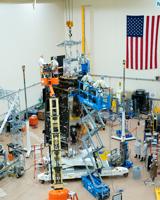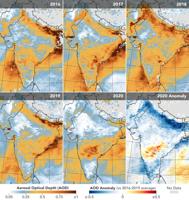Federal regulators have detected possible radioactive contamination in spices exported from Indonesia. The U.S. Food and Drug Administration found cesium 137, a radioactive isotope, in a sample of cloves sent by PT Natural Java Spice. That followed detection of cesium 137 in shipping containers and a sample of shrimp in August. No food that triggered alerts or tested positive has been sold in the U.S., but distributors have recalled hundreds of thousands of packages of shrimp that may have been manufactured in conditions that allowed them to be contaminated.
An undersea submersible has spotted crabs, worms and fish thriving on the surfaces of World War II explosives thought to be toxic to marine life. Scientists found more creatures living on top of warheads than in the surrounding seabed at a former weapons dump site in the Baltic Sea. Researchers filmed networks of anemones, starfish and other underwater life in the Bay of Lübeck off the coast of Germany. The study was published Thursday in the journal Communications Earth and Environment. It's the latest example of wildlife flourishing in polluted sites. Scientists hope to calculate how much contamination was absorbed by sea life.
Scientists in Colombia’s Amazon are capturing and testing endangered pink river dolphins to monitor mercury contamination from illegal gold mining and deforestation. The laborious operation, carried out only a few times a year, involves health checks, ultrasounds and sampling for diseases and toxins. Mercury levels in the dolphins have been found far above safe limits, reflecting risks to wildlife and people. Populations have sharply declined, and researchers say protecting the dolphins is inseparable from protecting the Amazon’s rivers and ecosystems.
Smith said the reason she suspects such green tomatoes is because of the wildfire smoke.
The TEMPO satellite launched yesterday from Cape Canaveral, Florida, on its way to space to explore pollution in Earth's atmosphere.
The air pollution in Louisville isn't as bad as it used to be.
An Air Quality Alert has been issued for Wednesday and Thursday, July 21 and 22 in Kentuckiana. "Fine particle pollution" (aka smoke particles) will be high enough down here at the ground to be unhealthy for sensitive groups.
Dirty air can create more lightning; that's the finding of a recent study looking at the connection between the number of lightning strokes near heavy smoke concentrations
The European Space Agency says air pollution is returning to pre-pandemic levels.
India placed a strict lockdown on citizens and businesses at the end of March to stop the spread of COVID-19. Now NASA is releasing satellite images from the area showing how large an impact that is having on pollution levels.






